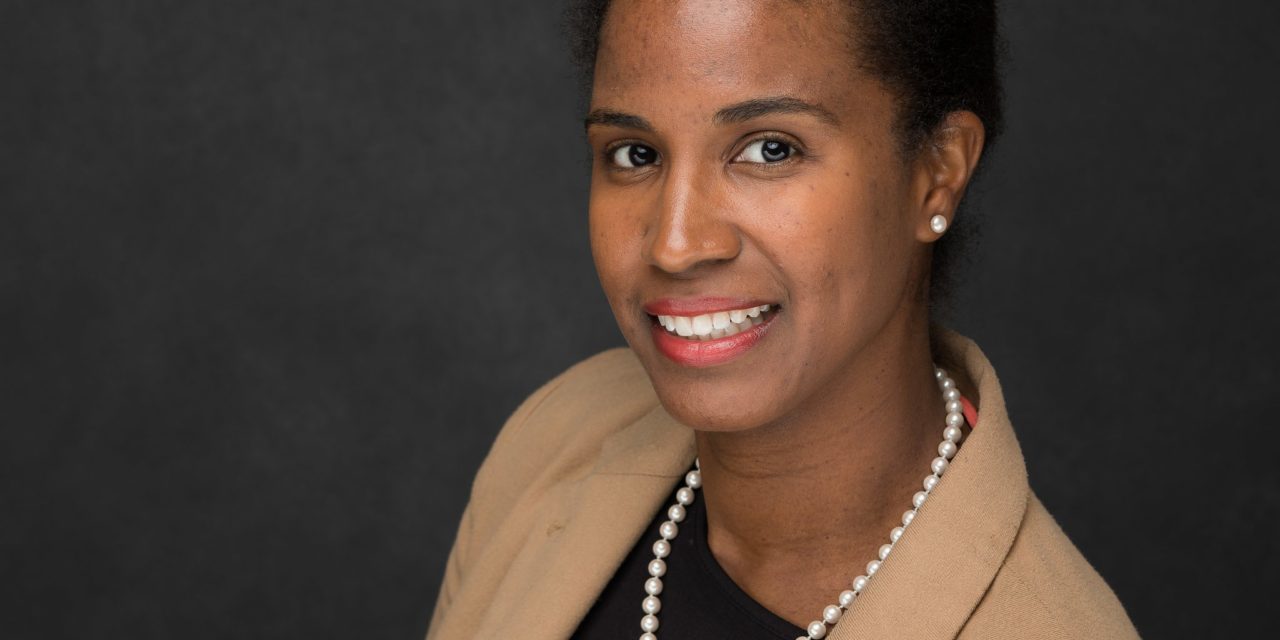A Conversation with Dr. Brandy Taylor Dédé, Ph.D., School Psychologist
HimPower continues its special series in Part II on Mental Health and Mental Well-Being with an interview focused on the School Psychologist. Dr. Brandy Taylor Dédé, Ph.D., shares her passion for empowering children and their families to live healthier lives wherever they might be. Dr. Dédé is a Licensed Specialist in School Psychology, and she knows that healthy children make healthier learners. Let’s learn and reflect on her words of wisdom for the HimPower Family.
Question: Dr. Dédé, as our children prepare to go back to school, what are the most important concerns you have about the mental health and well-being of school-age children?
Dr. Dédé: I firmly believe that our children’s response to going back to school depends on our response. If we show anxieties or fear, then they may reflect the same feelings. This is why I focus my efforts on how I communicate and respond to difficulties, because my daughter is watching every move I make. My greatest concern is the amount of information our children are exposed to on a daily basis. When we send our children off to school, we can’t control what they will hear from other children or from adults who may not realize they are listening. Therefore, since I can’t fully control what my daughter is exposed to outside of my reach, we daily cover each other in prayer during our ride to school. It is during this time she becomes more aware of mommy’s limitations and God’s sovereignty. This is what brings me peace as mom and what helps brings a sense of emotional and spiritual stability to my daughter each morning.
Question: Under what circumstances would a parent have contact with a professional like you in the school setting (whether public, private, charter, church)?
Dr. Dédé: As a Licensed Specialist in School Psychology (LSSP), also known as a School Psychologist in many states, I typically encounter families who have children in need of educational, social, emotional, and/or behavioral support. School Psychologists serve a variety of roles within educational settings, including, but not limited to, evaluator, consultant, community liaison, counselor, researcher, and advocate. Personally, I believe in a proactive approach when it comes to supporting children and families. I typically engage in psychoeducational trainings with parents (e.g., tips for parenting children with ADHD) and children (e.g., preventing bullying by showing acts of kindness).
Question: Much of what we hear about in the mass media and/or social media focuses on depression in adults. What is depression and/or anxiety as observed in school-aged children? How do you recognize it?
Dr. Dédé: It is important to know that depression and anxiety often co-exist in children and youth. According to the American Academy of Child and Adolescent Psychiatry, symptoms of depression may include the following: frequent sadness, tearfulness, and/or crying; decreased enjoyment in a favorite activity; feelings of hopelessness; low energy; low self-esteem; withdrawing from family and friends; increased irritability; sensitivity to rejection or failure; physical complaints (e.g., headache, stomachaches); difficulty concentrating; changes in eating or sleeping habits; poor performance in school; thoughts or expressions of self-harm. Symptoms of anxiety may include the following: excessive worry most days for weeks at a time; difficulty sleeping at night; feeling restless or fatigue when awake; difficulty concentrating; and irritability. Children and youth may exhibit periods of sadness and anxiety at different points in their life. This doesn’t automatically mean that they exhibit clinical depression or anxiety. The problem is when these symptoms disrupt their lives to the point that they can no longer function in day-to-day tasks over an extended period of time (i.e., at least six months).
Question: When does a school setting request the services of a school psychologist?
Dr. Dédé: The school psychologist is typically introduced when the child is having difficulty maintaining daily routines and expectations when compared to a peer. If you are concerned that your child may be experiencing any of these symptoms, you should communicate these concerns to your child’s doctor.
Question: Are there symptoms/signs that parents should recognize as indicators that a child is depressed or anxious about school?
Dr. Dédé: Children are typically inquisitive in nature until experiences occur that discourage their curiosity. If there are changes in your child’s desire to go to school or you notice an increase in physical illnesses towards the end of the weekend into Monday morning, pay attention to these changes. Changes in academic performance and relations with peers and adults at school may also be indicators.
Question: How can parents work more effectively with teachers and school administrators to address concerns about their child’s mental health or mental well-being?
Dr. Dédé: Communication is key. Trust your gut and immediately share your concerns with school staff. Also, be open to hearing concerns from school staff, even if they aren’t favorable. Be solution focused by asking, “How are we going to work together to ensure that my child can be her best self at school?” Then, follow up to ensure that both you and the school are following the plan that was developed.
Question: Based on your experience, what kind of “life happens event” potentially triggers depression or anxiety in school age children? (You may contextualize the response based on ages/grades)
Dr. Dédé: Death, natural disasters, loss of housing, and separation of parents are a few of the many events that could potentially trigger depression or anxiety in children and youth. Essentially, any major life change could trigger symptoms of depression or anxiety. How adults, within close proximity, respond to these events could significantly impact how children will respond in the moment and in the future when other unexpected changes happen.
Question: How do you characterize the relationship between a strong supportive Christian family (as prescribed in Deuteronomy 6:3-9) with achievement in school (K-12)?
Dr. Dédé: Before I delve into the relationship between a strong supportive Christian family and achievement in school, let’s pause to reflect on Deuteronomy 6:3-9. In summary, these scriptures show how following God’s teachings will lead to a long life with positive outcomes. The children of Israel were encouraged to pass on these teachings to their children and grandchildren so that they would receive the same outcomes. As this relates to the relationship between a strong supportive Christian family and achievement, there are principles taught within Christian families that will have a positive impact on children’s achievement in a school setting. For example, Christianity encourages total reliance on God, respect for figures in authority, respect for the rights of others, and respect for self, to name a few. Living out these principles would naturally increase a child’s confidence, perseverance, motivation, and access to positive relationships with peers and adults.
Question: What options do parents have if their children seem to be discouraged with the school setting or the school learning environment? How should parents intervene with school personnel if they suspect a child is discouraged by the learning environment?
Dr. Dédé: Parents always have the right to discuss their concerns about the school learning environment with school personnel. However, parents oftentimes don’t know how to approach the subject in an effective way. If it’s a classroom level issue, I strongly encourage parents to schedule a meeting with the classroom teacher, first, to discuss concerns. Unless there is clear evidence of a wrong that has been committed, parents should be prepared to discuss their behavioral observations of their child and share some insight as well as strategies they have used to support their child. The main focus is to form an alliance with your child’s teacher and establish a goal of creating a supportive and nurturing environment at school. If several futile attempts are made to align with your child’s teacher, then it is likely time to bring in an administrator to help with problem solving about your child’s needs.
Question: Too often, we hear news reports about episodes of bullying in school settings. How do we prepare our children to respond in a Christian manner to bullying? How can parents or extended family recognize symptoms of bullying (whether the child is the bully or the victim of bullying)?
Dr. Dédé: As Christian parents, we frequently encourage our children to show love and kindness towards others, and stand up for those who don’t have a voice. We may also teach them to turn the other cheek. As we teach our children to love, be friendly towards others, and be a voice for the weak, we also have to teach them how to use wisdom to ensure that all involved are safe. For example, there are times when it is sufficient to stand up to a bully by asserting confidence and stating in clear, uncertain terms that you will not be violated. However, there are times when the bullying is severe and needs to be reported to appropriate personnel at the school and/or law enforcement. Younger children may benefit from engaging in role play on how to handle different bullying scenarios, whereas older youth may benefit from dialogue about how to handle various types of situations. I believe that as we train our children to deal with bullying we should ensure that we don’t communicate a message that equates Christianity with weakness.
Based on my experience and as reported in the scientific literature, some indicators that (a) children or youth are being bullied or (b) that they are the bullies include the following:
- Children or youth who are bullied may have unexplained injuries, changes in appetite, frequent sick days in order to avoid school, personal items that are missing, poor grades, engage in self-harm, isolate themselves from others, avoid areas that are part of their normal routine (e.g., bus stop), experience changes in sleeping patterns, or be left out of social activities.
- Children or youth who bully others may exhibit behavioral difficulties across settings, get into trouble at school, be obsessed with popularity, have friends who show characteristics of aggressiveness, live in a violent home, or have difficult parental interactions.
Question: So, do you make referrals for a child to see a psychologist or psychiatrist (child, adolescent, or family)? If so, under what circumstances?
Dr. Dédé: In a school setting, I typically refer children and their families to psychologists if the school based counseling isn’t meeting their needs. Many times we are limited on what facets of a child’s life we can address in counseling. As a LSSP, I typically have to focus on difficulties that are directly impacting academic performance. As I have often discovered in my career, many children and youth come to school and perform well, but are still internally struggling with outside pressures (family, personal identity, etc.). Additionally, many children benefit from having family members involved in the therapeutic process. Meeting with a psychologist outside of the school setting will allow for more time to focus on all issues impacting the child and how the family members can support in the process.
Question: Do you have any recommendations for locating a Christian psychologist/psychiatrist that specializes in therapy for children?
Dr. Dédé: My first suggestion is to start with your clergy for recommendations. Many churches have become more open to addressing the mental and behavioral health needs of their congregation and may have someone in house that provides therapy for children and youth. Secondly, you can access websites such as Psychology Today (www.psychologytoday.com) that will allow you to easily search for Christian mental and behavioral health providers who work with children and youth.
Question: I know this is a loaded question, but what if you had to develop a mental wellness checklist for parents of school-age children, what would you include in the checklist?
Dr. Dédé: Many internal and external factors contribute to mental wellness. For example, mental wellness takes into account relationships with loved ones, financial status, school environment, home environment, and coping skills. My checklist would include ratings that would tap into various aspects of the aforementioned areas. In addition to a parent checklist, it would also be beneficial to have school-aged children complete a checklist as well that is developmentally appropriate.
Question: How do you assess your daughter’s mental readiness or mental well-being for the start of the 2018-2019 school year? Do you have any tips that might prove useful to other parents?
Dr. Dédé: Within our family unit, open communication is key. My husband and I emphasize to our 5-year-old daughter that she can always come to us, even if it feels uncomfortable. It’s very important for children and youth to know that they can come to you even if they have done something wrong. With that being said, I ask questions during play time, dinner, car rides and other activities.
As we approach this particular school year, I have been more sensitive to her overall wellness as she transitions to a new school. She has attended the same school for 4 years and has developed strong bonds with many of the children and families. I know this is a huge change for her, so we talk about it during play and in the car when it’s just the two of us. I asked her to share how she feels about moving to a new place and making new friends. Initially, she was very hesitant. After several conversations, I realized that she thought she would be the only new kid in the school and wouldn’t have any friends. If I had quickly shut down the conversation and told her “you’ll be fine” we would not have discovered the root of her fears and anxieties.
Now, she is ready to take on this new adventure with her family and has been sharing her excitement with others. I wish I could say that all of our conversations have been this easy, but they are not. Unfortunately, we have had to talk about the separation of families and death quite a bit this year. My daughter has watched me mourn the death of a very close family member and offered words of comfort. My gauge for knowing that she is mentally prepared for the start of the school year is that she expresses a variety of emotions. She expresses being nervous, but yet feeling happy. She also expresses that she will miss her friends, but is excited to make new friends. As long as she continues to show a variety of emotions and verbally expresses them to me, I feel confident in her ability to adjust.
My advice to parents of children at any age is to keep the lines of communication open. Ask open ended questions and don’t accept one word answers. For example, ask “What was your favorite moment today?” versus “Did you have a good day today?” Any moment is a good time to talk.
Question: What do you think are some of the characteristics of a strong Christian family? (Attributes that help our children develop emotional and spiritual maturity or stability). Are they characteristics that all of us can achieve if we are willing to work at it?
Dr. Dédé: When I think of a strong Christian family, my mind naturally falls on the fruits of the Holy Spirit (Galatians 5:22-23).
- Love
- Joy
- Peace
- Forbearance
- Kindness
- Goodness
- Faithfulness
- Gentleness
- Self-Control
Although Galatians 5:22-23 is a high standard, the most important thing is to strive to exhibit these gifts individually and within our family units. As we strive to exhibit these characteristics, it is our hope that our children will model these same attributes to others within their environment.
Question: What led to your passion about psychology in school settings? What has been your most rewarding experience in working with parents and their children?
Dr. Dédé: Simply put, I have a love for empowering children and youth. Working in a school setting seemed most natural because this is where children and youth spend most of their time outside of the home. Also, I firmly believe that healthy schools build healthy communities and healthy communities build a healthy world. The most rewarding experience has been empowering parents to advocate for their children’s social, emotional, behavioral, and academic needs. Many families I encounter have not had the healthiest interactions with the school system. They have lost faith in the school system and are frustrated. It’s rewarding to be able to bridge the gap between families who feel disenfranchised and the schools in which they have entrusted their children. What I have often found is that both sides, schools and families, want the best for their children but they have difficulty communicating their desires to each other which leads to mistrust and misunderstanding. I love when I can come into a difficult situation and bring all sides together focus on what’s best for the child. Additionally, I love to see parents become more knowledgeable about how they can best advocate for their children’s needs.
Dr. Shaw: Dr. Dédé, I can tell that you passionately minister to the needs of children and their families in school settings. I trust that the HimPower family is more informed, motivated, and encouraged by the information that you shared. As educators (teachers, administrators, staff, and other school personnel) prepare to receive our young people in public, private, and charter schools across the country, we are praying for them to have a safe and productive year.
While personal, family and life events may seem overwhelming at times, we serve a God who is able to do above and beyond what we ask or think.
Mary Shaw-Ridley, PhD, MCHES is a health education professional with over 25 years of experience. She is the President of Shaw & Associates, LLC, a health & education consulting group. She is also Chair and Professor of the Department of Behavioral & Environmental Health at a new School of Public Health/Jackson State University.





